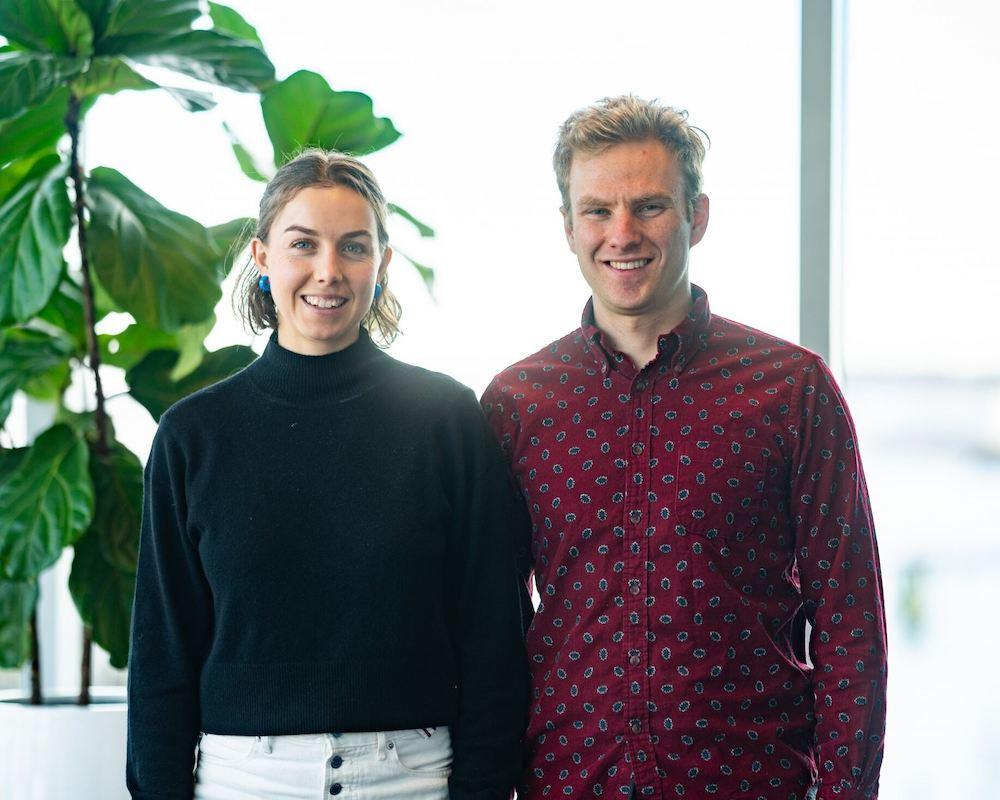Roux Grad Students Aim to Give Maine Kelp Farmers a Boost with New Innovation
As coastal Mainers, Jacob Inger and Claire Maurer naturally developed a deep reverence for the vast Atlantic waters that served as the backdrop of their day-to-day lives growing up in Yarmouth and Freeport, respectively.
So, it’s no big surprise that today, as graduate students at Northeastern’s Roux Institute, the two are embarking on a venture to help support the health of the waters that are such an important source of purpose and pleasure for so many in Maine.
The idea began as a spark, when Inger, who’s earning his master’s degree in data science, was working as an intern on the Roux entrepreneurship team last year. After stumbling upon an article that detailed how seaweed growth can be optimized using data, he began to imagine ways in which he could help implement those benefits. Inspired by his entrepreneurship colleagues and the startup founders who were participating in the Roux’s residency programs, he created WaveWise.
Joining him in the venture is Maurer, another Roux student earning her master’s degree in data analytics. Maurer and Inger, who already knew each other outside of the Roux Institute, have spent the last six months developing their idea and prototype in between their graduate courses.
Their aim is to help local aquaculture farmers by bringing them tech solutions that will mechanize their operations and provide real-time data monitoring. The aquaculture industry is a burgeoning one, as more people experiment with the sustainable practice. Kelp especially has become a popular alternative to materials that are harmful to the environment. Aside from being a healthy, nutrient-rich food, it can also be turned into an earth- and ocean-friendly fiber and used as fertilizer or biofuel. In other words, it’s a highly versatile and useful crop.
Being at the Roux Institute opened these doors for us. There’s no way I would have efficiently found the people and resources we needed without Northeastern.”
Claire Maurer
Roux Graduate Student and Entrepreneur
With this in mind, and with the help of Generate, a student-led product development studio at Northeastern’s Boston campus, Maurer and Inger created a working prototype – an automatic winch and airbag system that raises and lowers grow lines, with a device attached that takes in several key measurements, including water salinity, temperature, nitrogen, chlorophyll levels, and more. The device is powered by a solar panel attached to a buoy. With this prototype, kelp and shellfish farmers can automate the raising and lowering of their crops, a process that helps the crop access nutrients that exist at lower depths, as well as sheltering it from stormwaters and extreme temperatures that would be destructive in shallower waters. The sensor will give farmers continuous water column data, providing them with on-demand insight into their growing environment.
This past December, Maurer and Inger presented their concept and prototype to an audience of blue economy partners, mentors, and investors. The Gulf of Maine Research Institute’s BlueTech Boost Company Showcase was the culmination of a 10-week accelerator program that Maurer and Inger participated in, which provided them with a small grant, mentorship, and access to a vast network of experts in modern ocean technology.
“We were able to talk to a lot of people who have tons of experience in the blue tech realm,” Maurer said of the GMRI program. “We gained connections that we can turn to even beyond the program.”
As both Maurer and Inger work toward finishing their master’s degrees in 2024, they’ll continue to take advantage of Northeastern’s programs and resources as they work on their venture.

Maurer is completing a co-op with the Sherman Center, a Northeastern University organization that provides students with programs in product development and entrepreneurship. There, Maurer can work on the venture full-time, with help from Northeastern experts. Maurer and Inger were also selected to work with Generate for another semester and will continue to iterate on their prototype. Aside from that, the two are working on securing a patent and partnerships within the blue tech realm. Both agree that being at Northeastern has helped them accelerate the development of their business exponentially.
“Being at the Roux Institute opened these doors for us,” Maurer says. “Just coming to campus to do schoolwork and getting the opportunity to chitchat and make connections with people throughout the day has been so valuable. There’s no way I would have efficiently found the people and resources we needed without Northeastern. There were always people pointing us in the right direction.”
Inger credits his time interning on the Roux entrepreneurship team as his inspiration for starting WaveWise. “I never would have done this without the encouragement and help from the founders here at the Roux,” he said.
Inger has also been able to put the learnings from his data science classes into practice, building a database of information gathered from his prototype’s sensors. He eventually wants to create tailored algorithms for kelp farmers to help them better understand and leverage their water column.
“We just have crazy resources and expertise here at the Roux,” Inger said.